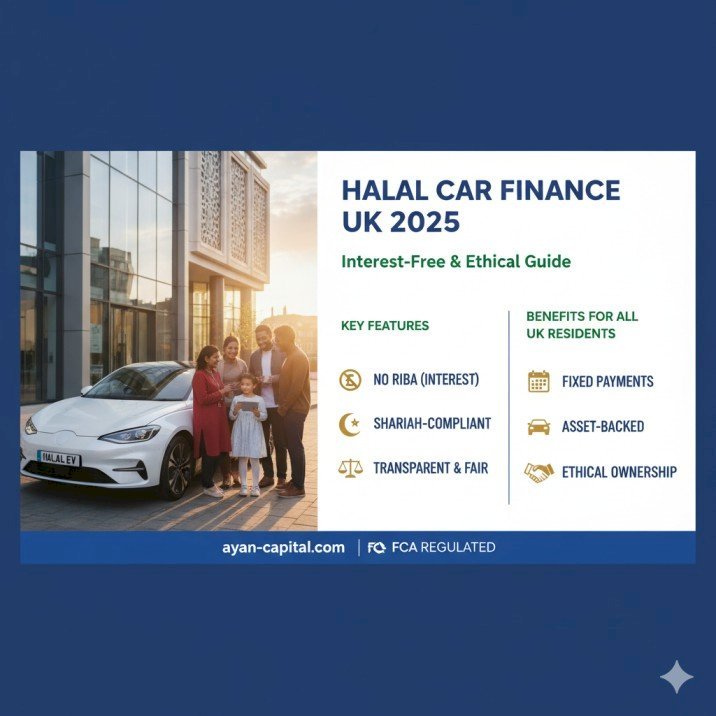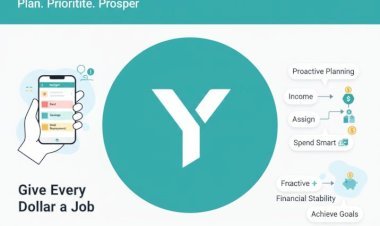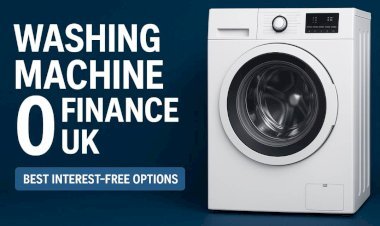Halal Car Finance UK 2025 – Interest-Free & Ethical Guide
Discover how halal car finance works in the UK 2025. Learn about interest-free Murabaha & Ijara options, FCA-approved banks, and ethical vehicle ownership.

Halal car finance offers an ethical, interest-free way to buy or lease vehicles in the UK. Following Islamic finance principles that prohibit riba (interest), it promotes fairness, transparency, and shared responsibility. Suitable for both Muslims and non-Muslims, halal finance has become a trusted, Shariah-compliant alternative to conventional car loans in 2025’s ethical finance landscape.
Across the United Kingdom, more consumers are turning to ethical and transparent financial solutions. In 2025, halal car finance stands out as a credible alternative for those seeking interest-free vehicle ownership. Rooted in Islamic principles that forbid interest and emphasise fairness, it replaces traditional loans with asset-backed, Shariah-compliant contracts. This growing model appeals not only to Muslims but to anyone who values clarity, responsibility, and ethical lending.
The Rising Demand for Halal Car Finance in the UK
The United Kingdom is widely regarded as one of the leading global centres for Islamic finance. According to a 2024 report by market research firm Mordor Intelligence, the UK’s Islamic finance market was valued at approximately 7.5 billion US dollars. This figure includes Islamic retail banking, investment products, and consumer finance, which together form a small but growing part of the overall financial sector.
At the same time, the demographic base supporting these products continues to expand. The 2021 Census recorded more than 3.9 million Muslims living in England and Wales, representing one of the fastest-growing faith groups in the country. Yet halal finance is not restricted to Muslims. Ethical banking products are attracting consumers of all backgrounds who prefer to avoid interest-based contracts or opaque fee structures. The ethical emphasis of halal finance—where every fee and margin is disclosed in advance—aligns naturally with this wider demand for transparency.
Urban regions with larger Muslim populations, such as London, Birmingham, Manchester, and Bradford, have led this trend. Increasingly, though, online platforms are extending access nationwide, enabling applicants from smaller towns and rural areas to obtain halal car finance without needing a local branch.
What Makes Car Finance “Halal”?
For a financial product to be halal, it must comply with the principles of Islamic law, or Shariah. The essential requirement is that the agreement must not involve riba—the payment or receipt of interest—and must avoid excessive uncertainty. Every transaction must relate to a real asset, and both parties must know the rights, risks, and responsibilities before the contract begins.
In the case of car finance, this means the arrangement must involve a genuine sale or lease of the vehicle, rather than a loan with interest attached. The finance provider must take ownership of the car before transferring it to the customer under agreed terms. Profit is permissible, but it must be fixed and transparent, not dependent on fluctuating rates.
Two main contract structures are used in the UK to achieve this: Murabaha, a cost-plus sale arrangement, and Ijara, a lease-to-own structure.
Murabaha: The Cost-Plus Sale Model
Murabaha is the simplest and most common form of halal car finance. Under this model, the finance provider purchases the car from the dealer at the cash price. The provider then sells the car to the customer at a higher price, which includes an agreed profit margin. That total price is divided into equal monthly instalments over a set term.
Because the sale price is fixed from the outset, there are no variable interest charges. The customer knows exactly how much they will pay and when. Ownership of the car normally passes to the customer immediately, or soon after the agreement begins.
For example, if the car costs £18,000, the provider might sell it to the customer for £20,000, payable over sixty months. The £2,000 difference is the provider’s profit, not interest. The key feature of Murabaha is that the bank earns profit through trade, not through lending.
Ijara: The Lease-to-Own Option
The second major model is Ijara, or Islamic leasing. In an Ijara agreement, the finance provider buys the car and retains ownership during the lease term. The customer pays monthly rent for the use of the vehicle, and at the end of the lease, they may have the option to purchase the car for a pre-agreed price.
Ijara contracts are particularly popular with those who prefer flexibility or who want to upgrade vehicles periodically. The monthly payments are comparable to lease rentals, and all terms—including maintenance and end-of-lease options—are defined at the start. Because no interest is charged, the arrangement remains fully Shariah-compliant.
Both Murabaha and Ijara are recognised globally as legitimate Islamic finance structures. In the UK, their use in consumer car finance is reviewed and approved by Shariah Supervisory Boards attached to each provider.
How Halal Car Finance Works in the UK
The process of arranging halal car finance in the United Kingdom is straightforward and similar to a conventional car finance application, though the contract structure is different.
First, the customer selects the vehicle they wish to buy, usually from a verified dealership or online platform. Whether it’s a family car or a luxury model through Mercedes car finance , halal finance providers follow the same ethical approach. The finance company purchases the vehicle directly from the dealer, ensuring full transparency and ownership transfer.
The customer and the provider then enter into a Shariah-compliant agreement—either a Murabaha sale or an Ijara lease—based on Islamic principles that prohibit interest. Payments are made monthly under fixed terms, with no hidden costs or variable interest rates.
In a Murabaha agreement, ownership of the car typically transfers to the customer at the start or shortly after the first payment. In an Ijara structure, the customer leases the vehicle and may choose to purchase it at the end of the term. All agreements are supervised by qualified scholars and regulated by the Financial Conduct Authority (FCA), ensuring compliance with both UK law and Islamic finance standards.
Access to Halal Car Finance Across the UK
Access to halal car finance is growing, though it still varies regionally. Greater London and the West Midlands have the highest concentration of providers, reflecting both larger Muslim populations and greater overall demand for ethical finance. Yorkshire, Lancashire, and parts of the North West are also seeing steady growth.
Online application platforms now make location less of a constraint. Several fintech companies and specialist brokers allow customers to complete the entire process online, from eligibility checks to Shariah approval. This digital expansion is helping to close the accessibility gap between major cities and smaller communities.
Leading Providers of Halal Car Finance in 2025
A number of organisations now offer halal or Islamic-compliant car finance products in the UK market.
Al Rayan Bank is the country’s longest-established Islamic bank. It offers products based on recognised Shariah structures and is regulated by the FCA and the Prudential Regulation Authority.
Ayan Capital, a specialist Islamic car-finance platform launched in Britain in 2023, focuses on Ijara wa Iqtina (lease-to-own) models, providing interest-free vehicle leasing under full Shariah supervision.
iCar Finance Ltd and several independent brokers also offer Islamic or halal car-finance options, marketing interest-free plans verified by qualified scholars.
Each provider applies its own conditions relating to vehicle age, deposit requirements, and credit assessment, but all are built on the same core principle: fixed, transparent costs with no interest.
Eligibility and Application Requirements
Eligibility for halal car finance mirrors that of conventional car finance, with some additional documentation for Shariah compliance. Applicants must generally be at least eighteen years old, resident in the UK, and able to provide proof of identity, address, and income. Both salaried and self-employed individuals can apply, though evidence of earnings will be required to assess affordability.
Vehicles usually need to meet certain age or mileage limits—often under seven years old at the start of the agreement—to qualify. Some providers require a deposit of ten to twenty percent, though zero-deposit options may be available to applicants with strong credit profiles.
Once the provider approves eligibility, a draft contract is reviewed by a Shariah scholar or board before final signing, ensuring that the arrangement adheres to Islamic legal principles.
Comparing Halal Finance with Conventional Car Finance
Halal car finance differs fundamentally from conventional car loans, which are based on lending at interest. Under a typical Hire Purchase (HP) or Personal Contract Purchase (PCP) arrangement, the customer borrows the cost of the car plus interest, repaying over a fixed term. In a PCP, a large final payment is required to take ownership.
By contrast, halal finance structures are entirely interest-free. Profit is earned through sale or lease, not through lending. The customer knows from the outset the total amount payable and the ownership terms. There are no balloon payments or hidden interest components.
This transparency has made halal car finance attractive even to consumers without religious motivations. It offers predictability, ethical credibility, and a clear legal structure overseen by regulatory authorities.
Advantages of Halal Car Finance
Halal car finance provides several advantages that extend beyond compliance with Islamic principles. The most important is the absence of interest, which eliminates exposure to rate changes and simplifies long-term budgeting. The fixed total cost also ensures transparency: customers understand exactly what they are paying for and why.
Because the finance is asset-backed, it aligns the interests of the provider and the customer, promoting fairness and accountability. In some cases, if late-payment fees are charged, these are directed to charity rather than retained as profit, maintaining the ethical integrity of the system.
Halal car finance is available for both new and used vehicles and increasingly for electric and hybrid cars, reflecting the UK’s transition toward sustainable transport. For consumers who value environmental and social responsibility, this combination of ethical and green finance is particularly appealing.
Trends in 2025: The Digital and Ethical Shift
Several notable trends define the halal car-finance market in 2025. The first is digitisation. Most providers now offer online application systems, digital document uploads, and virtual Shariah approval processes. This has shortened approval times and broadened access.
Second, demand for used-car and electric-vehicle finance is rising as customers seek affordability and sustainability. Islamic banks and fintechs are responding by developing flexible Murabaha and Ijara products that accommodate these vehicles.
Third, the ethical-finance market is expanding beyond faith-based motivations. Many non-Muslim customers now choose halal products for the same reasons they support green banking or community credit unions: clarity, fairness, and social good.
These developments position halal car finance as part of a larger movement toward inclusive and responsible financial innovation.
Real-World Experiences
Customers who have used halal car finance in the UK often highlight the transparency and peace of mind it provides. One buyer from Birmingham described using an Ijara lease to finance his electric car through a specialist Islamic provider. The application, he explained, was clear, quick, and free of hidden charges. The assurance that no interest was involved added an ethical dimension to what was otherwise a routine financial transaction.
Such experiences show that halal car finance can deliver both practicality and principle, combining modern convenience with traditional ethical values.
Common Questions About Halal Car Finance
Can non-Muslims use halal car finance?
Yes. These products are open to all customers. They are simply structured in accordance with Islamic finance law, which emphasises ethical profit and transparency.
Can used or electric vehicles be financed?
Most providers allow used cars, provided they meet age and condition criteria. Electric and hybrid vehicles are increasingly included as part of sustainable-finance programmes.
Is early repayment possible?
In many cases, yes. Early settlement terms are typically specified in the contract. Some providers may charge an administrative fee but do not profit from it.
What if I miss a payment?
Missed payments may incur a small penalty. Reputable Islamic providers often donate these fees to charity rather than treating them as income.
Do I need a deposit?
Deposits vary by provider and applicant profile. A down payment of ten to twenty percent is common, though some lenders offer no-deposit arrangements.
The Future of Halal Car Finance in the UK
The steady rise of halal car finance reflects broader changes in the UK financial landscape. Consumers are increasingly conscious of how their money is managed and are willing to seek out ethical alternatives to traditional loans. Islamic finance offers a well-regulated framework that meets this demand while remaining true to its core principles.
As digital technology continues to improve accessibility and as more providers enter the market, halal car finance is likely to become a familiar part of everyday financial life in Britain. Whether chosen for faith-based reasons or for its ethical and transparent structure, it offers an appealing path to vehicle ownership without interest and without compromise.
Conclusion
Halal car finance has become more than a faith-based choice; it represents a wider shift toward ethical and transparent financial living in the UK. By eliminating interest and prioritising fairness, it offers a genuine alternative to conventional car loans. Whether driven by religious belief, sustainability, or a desire for financial clarity, consumers now have access to credible, regulated Shariah-compliant options. As digital platforms expand and awareness grows, halal car finance is poised to become a mainstream model of responsible ownership—one that allows drivers to purchase vehicles with confidence, integrity, and complete peace of mind.
FAQs
1. What is halal car finance and how does it differ from a normal car loan?
Halal car finance follows Islamic principles that prohibit interest (riba). Instead of lending money, the finance provider either sells the car to you at a fixed profit (Murabaha) or leases it to you (Ijara). You pay predictable monthly instalments with no hidden interest, ensuring fairness and transparency.
2. Is halal car finance legal and regulated in the UK?
Yes. All legitimate Islamic finance providers in the UK must be authorised by the Financial Conduct Authority (FCA). Their products are reviewed by Shariah Supervisory Boards to ensure compliance with Islamic law, so consumers are fully protected under UK regulation.
3. Can non-Muslims apply for halal car finance?
Absolutely. Halal finance is open to everyone. While it is designed to comply with Islamic law, its principles of ethical profit, clear ownership, and interest-free structure appeal to non-Muslims who value fairness and transparency in lending.
4. What are the main types of halal car finance available?
Two primary structures are used:
-
Murabaha: The provider buys the car and sells it to you at a fixed profit, repayable over time.
-
Ijara (Lease-to-Own): The provider leases the car to you, and ownership transfers at the end of the lease if you choose to buy.
5. Does halal car finance cost more than conventional finance?
Not necessarily. The total price may include the provider’s profit margin, but there is no compounding interest. Because costs are fixed and transparent, many customers find the predictability and fairness outweigh any small price difference.
6. Can I get halal finance for used or electric vehicles (EVs)?
Yes. Most UK providers allow financing for used cars (subject to age and condition limits). Many are also expanding into electric and hybrid vehicle finance to support sustainable and eco-friendly transport choices.
7. Do I need to pay a deposit for halal car finance?
Many providers ask for a 10–20% deposit, though this varies by provider and credit history. Some fintech and cooperative models may offer low- or zero-deposit plans if you meet affordability criteria.
8. What happens if I miss a payment?
If you miss a payment, you may incur a penalty or administrative fee. However, under Shariah principles, providers cannot profit from such fees. Reputable Islamic finance institutions usually donate them to charity, maintaining the ethical integrity of the agreement.
9. Can I settle my halal finance agreement early?
Yes. Early settlement is generally permitted in both Murabaha and Ijara contracts. You should check your provider’s terms, as some may charge a modest administrative fee for processing the settlement, but this is not profit-based interest.
10. Is halal car finance available online?
Yes. Many UK banks and fintech platforms now offer online applications for halal finance. You can upload documents digitally, receive Shariah approval electronically, and manage your payments through online banking, making the process fast and convenient.

 Jack Turner
Jack Turner 















